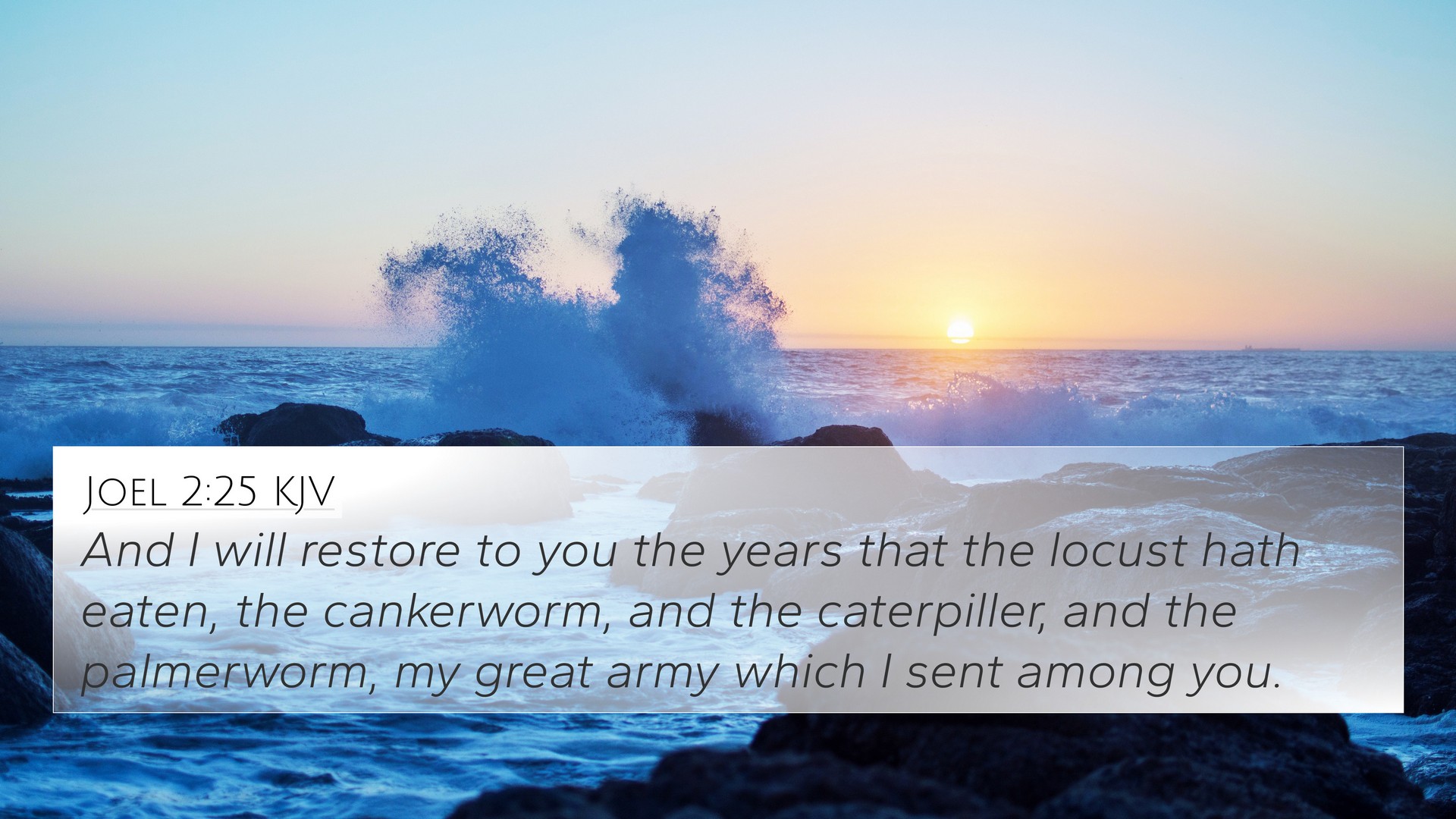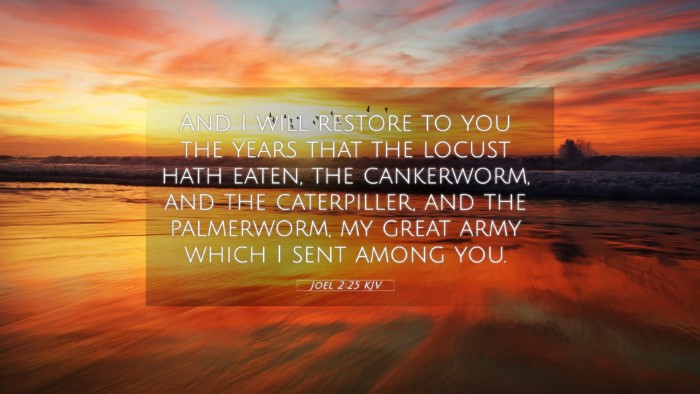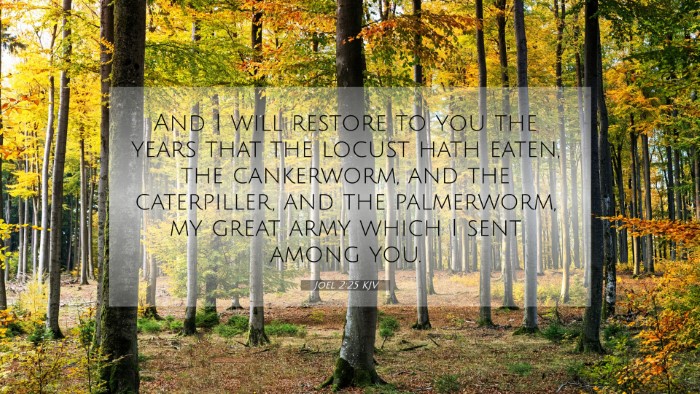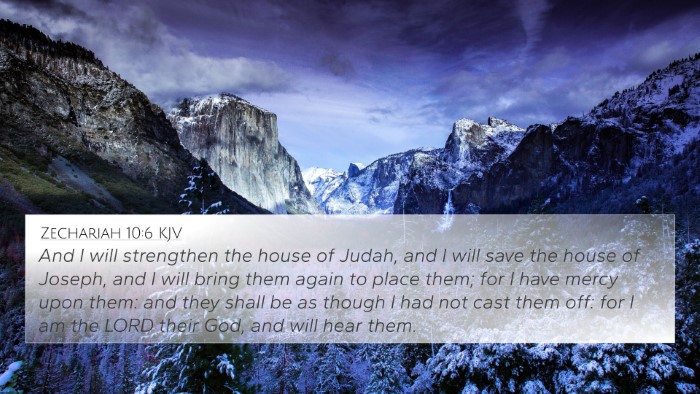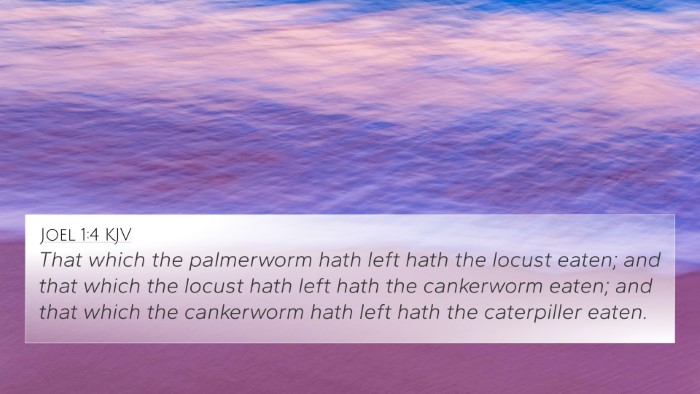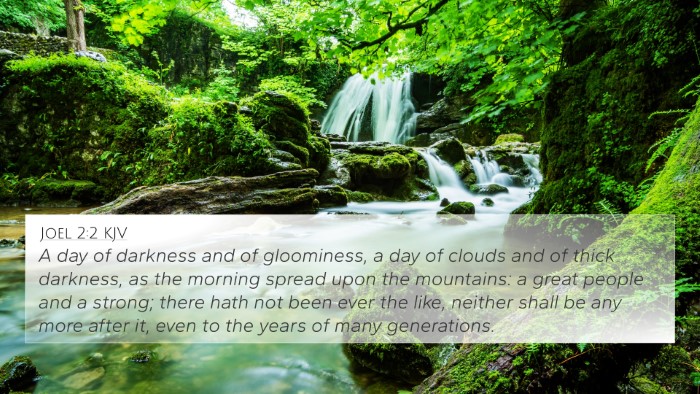Understanding Joel 2:25
Verse Text: "And I will restore to you the years that the locust hath eaten, the cankerworm, and the caterpillar, and the palmerworm, my great army which I sent among you." (Joel 2:25, KJV)
Summary of Meaning
The verse Joel 2:25 is a profound declaration of restoration by God. After a devastating plague of locusts, which signifies destruction and despair, God promises to compensate His people for the loss they have suffered. This indication of restoration is not only physical but also spiritual, inviting a return to fellowship with Him. The verse emphasizes God's mercy and the hope that He offers to those who repent and turn back to Him.
Insights from Public Domain Commentaries
From the insights of Matthew Henry, Albert Barnes, and Adam Clarke, we gather a deeper understanding of the implications of this restoration.
- Matthew Henry: He emphasizes that the locust plague symbolizes divine judgment. God's promise of restoration connects to His grace, showing that no matter the depth of sin or devastation, He can bring healing and rejuvenation. The "years" lost represent not just time but also the lost opportunity for spiritual growth and prosperity.
- Albert Barnes: Barnes expounds on the metaphor of restoration. The locusts represent various sins and ways that humanity may stray from God. He highlights that God’s promise implies both a reclamation of what was lost and a future rejuvenation—a theme echoed throughout scripture where God restores His people to their original glory.
- Adam Clarke: Clarke points to the specific insects mentioned and notes that their destruction was comprehensive. He interprets the 'great army' as a divine tool of judgment and restoration implies the merciful nature of God in His commands. The restoration can also signify a return to covenant blessings, asserting that God desires a relationship with His people.
Bible Cross-References
To gain a fuller understanding of Joel 2:25, one can refer to the following Bible verses that share similar themes of restoration and divine mercy:
- Jeremiah 30:17: "For I will restore health unto thee, and I will heal thee of thy wounds, saith the Lord." This verse reinforces God's promise of healing and restoration.
- Isaiah 61:7: "For your shame ye shall have double; and for confusion they shall rejoice in their portion: therefore in their land they shall possess the double: everlasting joy shall be unto them." A parallel thought on receiving double for loss.
- Psalm 126:5-6: "They that sow in tears shall reap in joy." This highlights the joy following periods of suffering and loss, resonating with the hope of restoration.
- Romans 8:28: "And we know that all things work together for good to them that love God." This scripture underscores God's promise to work all things, even our losses, for good.
- 2 Corinthians 5:17: "Therefore if any man be in Christ, he is a new creature: old things are passed away; behold, all things are become new." Restoration in Christ parallels the renewal indicated in Joel.
- Revelation 21:5: "And he that sat upon the throne said, Behold, I make all things new." This declaration speaks to the ultimate restoration at the end of time.
- Zechariah 9:12: "Turn you to the strong hold, ye prisoners of hope: even today do I declare that I will render double unto thee." God’s promise to His people of hope and restoration.
Thematic Connections
Joel 2:25 establishes deep thematic connections within the Bible. The theme of restoration runs throughout both the Old and New Testaments.
- Divine Mercy: The character of God as merciful is consistent in scriptures such as Ephesians 2:4-5, where it reflects on God's rich mercy and love.
- Hope After Judgment: The idea that God brings hope post-judgment can be further explored in Lamentations 3:22-23 where God’s mercies are declared new every morning.
- Spiritual Renewal: The transformation and renewal of believers in Christ can be compared to passages like 1 Peter 5:10 which speaks of God restoring us after suffering.
Cross-Referencing Insights
In performing comparative analysis through cross-referencing Bible verses, we see how Joel 2:25 enriches our understanding of God's nature and His plans for humanity. Here are methods for effective cross-referencing:
- Utilizing a Bible concordance to locate themes such as "restoration" and "mercy." This tool aids in identifying verses that resonate with Joel 2:25.
- Engaging in cross-reference Bible study by comparing the Old Testament verses with New Testament teachings about God's restorative nature.
- Employing a Bible cross-reference guide to systematically examine passages that address God's promises.
Conclusion
Joel 2:25 invites readers to reflect on the transformative power of God's restoration in the midst of despair. Through the combined insights of various commentaries and the rich tapestry of cross-references, we see the overarching theme of hope, healing, and divine mercy that unites the scriptural narrative. As we pursue deeper understanding through tools and methods of cross-referencing, we are encouraged to connect Scripture in ways that illuminate God's ongoing work in our lives.
